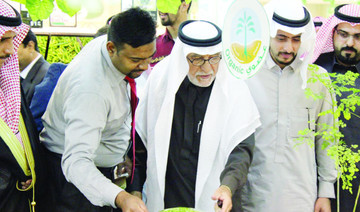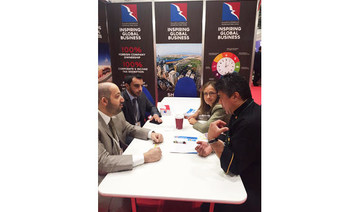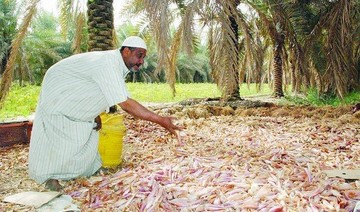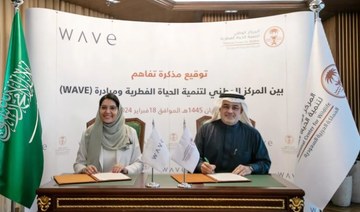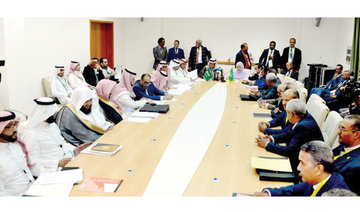DUBAI: Omar Al-Jundi is not your average Saudi Arabian farmer. In fact, he is not even related to farming by degree. But that is exactly where the industrial engineer found his calling, when he built the region’s first vertical farm in the heart of Dubai.
Born in Egypt to Saudi parents, Al-Jundi spent his early years in Alkhobar due to his father’s engineering firm.
The family moved to Jeddah when he was 12 years old. His last two years of schooling were spent at Bahrain School in Manama. “I wanted to graduate with an American high school diploma,” Al-Jundi said. “At the time, as a Saudi, you couldn’t attend private foreign schools.”
Upon graduation, he left the region to study industrial engineering, followed by an MBA at the University of Miami in Florida. Although his father is an engineer and his mother an architect, Al Jundi delved into the world of banking for two and a half years when he moved back to Jeddah upon graduating.
“I then shifted to the hospitality industry, opened the first lounge in Jeddah along with other restaurants with my friends, and ended up selling my share and joining my father’s company,” he said. “You learn that you’re better off doing something on your own than having partners because you end up changing directions.”
After 10 years of “paying his dues” in the family business, he felt compelled to change directions. “As an Arab, you’re always closely tied to the family,” he said. “We’re blessed my father started a business and there’s a place for us in that business, but luckily, my younger brother was a lot more interested in it — I always felt my calling was somewhere else.”
In search of his true passion, he started his journey as an entrepreneur. The field he specialized in had yet to be determined. “I felt that there was a meaning for something else,” Al-Jundi said. “I was free and my family was very supportive.”
Countless research and books later, he became intrigued by the tech space, admitting he believed he would start the next Amazon. “That didn’t follow through,” he said. “Then I thought it would be in mining, but I always looked for something that was away from my comfort zone such as engineering, contracting, real estate and consulting. Just something different. It was a process.”
The young Saudi had reached a point in his life where he felt the need to do something impactful, something which added true value to the region. Eventually, two of his friends introduced him to the concept of modern farming. “I visited some orange farms in Egypt and I was in exploration research mode,” he said. “I enjoyed seeing nature — you’re a lot more relaxed. Here, when you go in and see the plants growing every day, there’s definitely a connection, because you’re seeing the end product, you’re feeling it, and I connect to them.”
The more research he immersed himself in, the more driven his interest became. At the time, the Saudi Government was focused on addressing food security and self-sufficiency. “It’s always been a big topic,” he said. “When you fly out of Riyadh, you find these big circular green spots as they’re trying to green and farm the desert, which was successful, but on the other hand, it depleted our water resources.”
According to the Food and Agriculture Organization, agriculture represents around 70 per cent of water consumption in most of the GCC countries. But Al-Jundi did not give up on the thought.
After moving to Dubai in 2014, he learned about King Abdullah’s Initiative for Saudi Agricultural Investment Abroad. Half the capital needed for agricultural projects was offered to Saudis who invested in a list of 31 countries abroad to purchase land, set up a project and export the food back to the Kingdom. It gave him an idea to start his own vertical farm. “I knew it was a big topic,” he said. “I’d never heard we could grow food with no soil. I thought it was intriguing and fascinating. It was enough for me to know there was something there to explore it further.”
With more than 90 per cent of the region’s land unsuitable for agriculture, Al-Jundi set out to find a solution. He spent the following 12 weeks taking courses in aquaponics, aquaculture, hydroponics and horticulture in California and the Netherlands. He even spent time working in a cucumber greenhouse at the Delphy facility in Holland, where he acquired valuable experience in the field. “It was really professional and a great learning experience,” he said. “That’s when I knew what I wanted to do. And I knew I had to completely immerse myself in it.”
The team of Badia Farms, which he founded in Al Quoz in December last year, consists of 12 people, all of whom have experience in farming. “It took 18 months to get it up and running because we didn’t work with any technical partner,” Al-Jundi said. “I knew I was in it for the long haul, so I worked with different growers and learned.”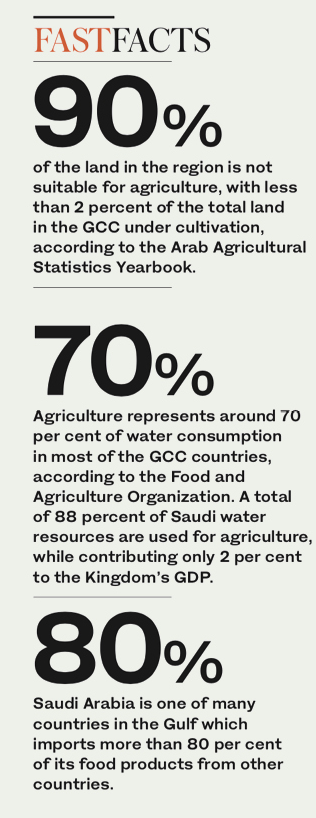
The 850-square-meter facility includes a “fertigation” room, which fertilizes and irrigates the 18 varieties of crops he currently grows. Gourmet seeds, some of them hybrids, such as lemon basil, cinnamon kale, wasabi, green radish, mustard, micro kale, edible flowers and cinnamon basil, are flown in from the United Kingdom and the United States every three months — from 50 to 300 kilograms at a time. The farm plans on introducing as many as 26 varieties, including sunflowers.
The seeds are placed on a type of mat made of recycled carpet that is food-certified. LED lights flood the room in a pink atmosphere, with each UV light containing a certain spectrum that is beneficial for the plants.
In the tank room, feed and water is scheduled through a computer based on the crop, with a unique nutrient recipe for each type, including potassium, calcium, magnesium and ammonium. UV and concentrated oxygen are also able to kill any potential bacteria or pathogens in the recycled water.
Once the seeds sprout, they are moved to the five stacks in the vertical farm. Four dehumidifiers regulate the humidity in the air, providing each on average with 70 litres of water a day. The eco-system created by Badia Farms uses 90 per cent less water than open field farming and recycles its water up to nine times.
“We’re using hydroponics,” Al- Jundi said. “The biggest advantage is that we do not spray pesticides, which are messing up our health. In fact, we extensively use stickers to attract insects away from the crops.”
Different levels of lighting are provided for each stage of the plants, before they are sent out as they were grown. “They’re intense in flavor and it’s the freshest you can get that way,” he said. “My personal favourite is chocolate mint.”
With 60 clients so far, serving hotels, restaurants and cafes, the model is a first for the region, which made it challenging to set up. “All the ones abroad are designed for different climatic conditions so none of them are applicable here, where there is extreme humidity and high temperatures,” he said. “And to convince a chef to give you his time, when you don’t have the track record, was a big challenge. I wasn’t a known farmer yet.”
The system’s structure was manufactured in Riyadh, with a plan to set up the next facility by 2020 in Jeddah. Until then, the plan is to cater to Saudi as well as the UAE. “Dubai is a good testing ground and Saudi’s vision now is to support our type of sustainable growing and ecological farms, so it’s perfectly in line with what we want to do,” Al-Jundi said. “The government is now delegated to move into sustainable growing and find viable solutions to address self-sufficiency, so it’s not a slogan anymore: it’s the real deal.”
He hopes to develop similar projects across the Kingdom in the future. “My aim is to make sure we truly become self-sufficient,” he said. “Vertical farming is one solution but it’s not the full one — the ideal solution lies in all models of modern farming. What’s close to my heart is giving people healthy food while preserving our resources, and I believe the new generations of Saudis are ambitious and want to evolve our country. We were just waiting for the opportunity and it has finally come.”
How does his garden grow? Sustainably, in the desert
How does his garden grow? Sustainably, in the desert
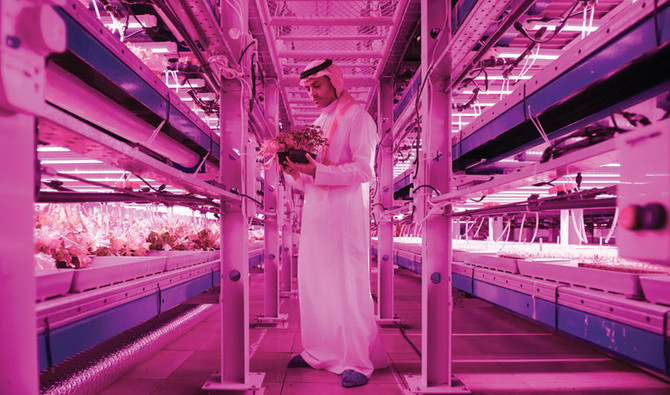
- Saudi farmer Omar Al-Jundi has built the region’s first vertical farm in Dubai with plans for Jeddah in 2020
- The team of Badia Farms, which he founded in Al Quoz in December last year, consists of 12 people, all of whom have experience in farming.
Saudi environment and water minister heads Kingdom’s delegation at World Water Forum

RIYADH: Saudi Arabia’s Minister of Environment, Water and Agriculture, Abdulrahman Al-Fadhli, is heading the Kingdom’s delegation participating in the 10th World Water Forum in Bali and will attend the high-level session, on behalf of Crown Prince Mohammed bin Salman.
The forum, inaugurated by Indonesian President Joko Widodo, kicked off Saturday and runs until May 25, with heads of state and government, ministers and officials from 180 countries, and 250 international organizations attending.
The Kingdom is participating with a high-level delegation representing the water sector, and will participate in an exhibition that highlights its efforts in developing the water industry through its regional and international contributions.
It will also organize a dialogue session on the sidelines of the forum in preparation for the Kingdom’s hosting of the 11th session of the World Water Forum in 2027 in Riyadh, under the slogan “Action for a Better Tomorrow.”
The Kingdom’s hosting of the event also comes as “confirmation of Saudi Arabia’s role in addressing water challenges around the world and its commitment to issues of environmental sustainability, based on what it has provided over decades of pioneering global experience in producing, transporting and distributing water and innovating technical solutions to its challenges,” the Saudi Press Agency reported.
The Kingdom has helped push water issues to the top of the international agenda, a move it adopted during its hosting of the G20 in 2020, and to put strategic plans to ensure water security, strengthen partnerships with global and scientific institutions, and build capacities at all levels, SPA added.
This year’s forum is being held under the slogan “Water for Shared Prosperity,” and will discuss several sub-themes, including water security and prosperity; disaster risk reduction and management; and hydro-diplomacy.
Tears of joy as American reunites with Saudi family after 40 years

- Relatives in Saudi Arabia say they ‘never lost hope’ they would one day find Eid Alsumani
- Eid and his older brother grew up in Alabama estranged from their father and other family members
JEDDAH: A four-decade long search has finally led to the heartwarming reunion of an US citizen with his Saudi family, putting an end to a painful era full of longing and searches that had long promised to end in disappointment.
Two-year-old Eid Alsumani, now 42, and his older brother’s American mother cut ties with the family for reasons that have not been revealed to the public.
She had met Saud Alsumani when he was a student in the US, after which they married and had two sons.

Following her return to Alabama with the boys, Eid’s mother cut all communication between them and their father, who returned to Saudi Arabia.
“Throughout that period of time, which lasted 40 years, members of the family were searching for their sons through the American Embassy ... (they) tried to search for the family several times, but no leads helped,” said Bander Alsumani, Eid’s cousin.
HIGHLIGHTS
• A video of Eid Alsumani’s reunion with his family at King Abdulaziz International Airport after 40 years of separation went viral on social media.
• For decades, the family had tried everything including seeking the help of the Saudi Embassy in Washington.
An English teacher at Abdullah Al-Thagafi High School in Jeddah, Bander told Arab News that his family did not lose hope in finding the lost brothers. “We just hoped they were alive.”
After decades of searches that yielded no results, their father died, never having reconnected with his sons. Their uncle, Khalid Alsumani, went to the US, determined to find his estranged nephews.

According to Bander, while the uncle sought the help of the Saudi Embassy in Washington, the perseverence of another member of the family paid off as they found Eid on Instagram.
“It was the happiest day for the family ... we all were in joy and happiness when we heard Eid is alive and coming back home with his uncle,” said Bander. The joy also came with the sad news that Eid’s older brother had already died.
Eid and his family were finally reunited on May 9, with many of them meeting their 42-year old relative for the first time.
I believe I will visit again in maybe six months. Inshallah, I will continue to learn more about my religion, Arabic, and my family.
Eid Alsumani, Found after 40 years
“It was the most wonderful feeling in the world … just couldn’t believe that the family had been reunited with (their) son after so many years,” said Bander.
A heartwarming video of Eid’s reunion with his family at King Abdulaziz International Airport after 40 years of separation went viral on social media.
When Eid appeared from passport control with his uncle, his cousins and relatives hugged him one after another tightly, shedding tears of joy.
The family hosted a gathering with various members of the family who came from all corners to meet the long lost son and celebrate the joyous occasion.
During the emotional reunion, Eid, dressed in traditional Saudi attire, expressed his immense happiness and relief at being reunited with his extended family.
A US citizen, Eid was raised in Alabama and currently resides in Florida having graduated with bachelor’s of science degree in history and nuclear engineering technology.
Speaking to Arab News after performing Umrah in Makkah, Eid described the scene at the airport as “unbelievable.”
He said: “It was surreal. It was the first time I had been in my fatherland.
“I was extremely excited about the blessings of seeing four family members who greeted me with the legendary hospitality of Saudi fame. It felt like a scene from a movie.”
Eid, who was raised by his mother with Christian values, has reconnected with Islam with the help of his Saudi relatives.
He described praying in the Grand Mosque in Makkah as an unforgettable moment in his life. “When I was in Makkah, I was amazed to see so many people from all over the world who were walking and praying together as one for the sake of Allah,” he said.
Speaking about his future in the Kingdom, he added: “Alhamdulillah, my stay has been extended for a few days … I believe I will visit again in maybe six months. Inshallah, I will continue to learn more about my religion, Arabic, and my family.”
Wildlife center to explore caves in Saudi Arabia’s north

- The program to explore biodiversity in caves was launched “due to its environmental significance and positive impact on wildlife”
RIYADH: Teams from Saudi Arabia’s National Center for Wildlife will begin examining various caves in the Northern Borders region as part of the Caves Exploration Program, which began in 2022.
It comes as part of a larger program that monitors ecosystems and biodiversity throughout the Kingdom.
These sites will be added to an international map of biodiversity and natural heritage hotspots as historical ecosystems and natural biological museums.

Dr. Mohammed Ali Qurban, CEO of the center, explained that the discoveries in the caves hold significant historical environmental value for Saudi Arabia.
“The cave ecosystems serve as a historical museum, providing evidence of the biological diversity that has existed in the Kingdom throughout various historical eras, as well as the spatial, environmental, and climatic changes in the Arabian Peninsula,” he explained.
The cave ecosystems serve as a historical museum, providing evidence of the biological diversity that has existed in the Kingdom throughout various historical eras.
Dr. Mohammed Ali Qurban, National Center for Wildlife CEO
Qurban added that these unique ecosystems provide a suitable environment for a wide range of organisms, as evidenced by the discovery of numerous skeletons of different types of mammals.
The program to explore biodiversity in caves was launched “due to its environmental significance and positive impact on wildlife.”
The center is currently completing studies on the targeted cave sites and documenting their importance within an integrated program.
According to Qurban, the center’s earlier discovery of several Arabian cheetah mummies in a cave in the northern part of the Kingdom — with some skeletons estimated to be over 4,000 years old — provided the first evidence of the species’ presence in the Kingdom.
Consequently, the center plans to develop a program for the resettlement of the Arabian cheetah in the Kingdom, enabling it to play a crucial role in maintaining environmental balance.
Qurban noted that, among other significant discoveries, researchers from the center discovered rare bats and the remains of several extinct animals.
The center is currently working on classifying these finds and determining their ages. This effort will facilitate the resettlement of these extinct species or their closest genetic relatives, thereby restoring their role.
The cave ecosystem is one of the rarest and most important of its kind in the world, recognized as natural heritage by UNESCO.
There are 1,826 caves in the Kingdom, consisting of underground passages and tunnels formed by natural processes in dry limestone areas — evidence of a historical era that experienced prolonged rainy climatic conditions.
Jeddah university opens maritime studies to women

- The university will set up a dedicated agency for female students within the maritime studies faculty as part of an initiative that aligns with Saudi Arabia’s Vision 2030
RIYADH: Jeddah’s King Abdulaziz University will enroll women in its maritime studies programs for the first time, the Saudi Press Agency reported on Saturday.
The university will set up a dedicated agency for female students within the maritime studies faculty as part of an initiative that aligns with Saudi Arabia’s Vision 2030, which encourages Saudi women to enter new professions, and aims to expand research and study opportunities in this field.
Faisal Al-Thobiani, dean of the faculty of maritime studies, said the move will harness women’s potential in the sector, increasing overall efficiency and sustainability.
The faculty will provide internationally recognized education and training in marine surveying and transport, helping to prepare Saudi professionals and support national economic growth.
Al-Thobiani said that increasing women’s participation will address workforce gaps in the Kingdom’s maritime industry in line with global trends.
Growing female involvement in the sector comes as Vision 2030 prioritizes women’s representation across various industries, he added.
Mauritanian president departs Jeddah after performing Umrah

JEDDAH: The President of Mauritania Mohamed Ould Ghazouani left Jeddah on Saturday.
He was seen off at King Abdulaziz International Airport by Makkah Deputy Gov. Prince Saud bin Mishaal bin Abdulaziz and several other officials, according to a report by Saudi Press Agency.
Ghazouani arrived in the Kingdom recently with an accompanying delegation to perform Umrah. He also visited the Prophet’s Mosque in Madinah and performed prayers there.



